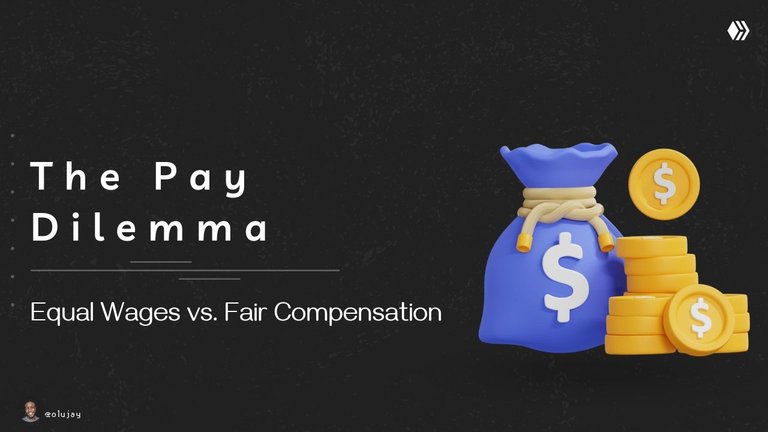The Pay Dilemma: Equal Wages vs. Fair Compensation
"No food for a lazy man," as it is commonly said, implies that when you work, you earn, and that's how you afford what you need. The catch, however, is that should everyone get the same pay, or should pay be based on factors like how good you are at your job? Today, let's discuss equality vs. equity when it comes to pay.

Unless one is underage or is in an excusable condition or something, of course, they may have to be a beneficiary of some benefactor. The general populace of everyday people must act accordingly and work and earn to get by every day.
Equality in Pay
What it means to have equality in pay is that all workers receive the same wage, regardless of their job, skills, or experience. In general, this approach is often meant as a means to promote fairness and eliminate wage discrimination.
Considering how the world has been built and how it is run and that it is people with higher wages that are taken as upper-class workers, discrimination can set in in many ways. It does make sense in certain ways to want to take this approach, equality in pay.

The way humans are wired, however, is that our rewards and how they are given to work greatly impact their incentive to do things at a job. If workers know that they receive the same pay as their peers regardless of their effort and contribution, they may lack the incentive to improve their skills or even work harder.
We can all relate to statements resulting from that such as, "After all, why bother when I would get the same thing as those other guys that do way less?"
The truth of the matter is that not all jobs are equal in terms of skill, responsibility, or demand. One really cannot compare the responsibilities and required skill levels of doctors, nurses, and surgeons with one another, as they have varying levels of education, training, and specialization. Applying equal pay wouldn't just cut it in some cases.
Equity in Pay
Equity in pay, on the other end of the rope, means to be fair and just with pay. Wages would be adjusted to account for factors such as skills, experience, responsibilities, and performance. It accounts for fair compensation in relation to individual circumstances.
Jobs are usually not the same. There are always those who would do more and those who would do less. Effort can be subjective sometimes, but a general perspective of human capabilities can help provide a reasonable scale for rewarding efforts. Equity in this scenario can motivate workers to actually develop their skills and excel in their roles, as they see a direct correlation between effort and rewards.
Equity-based system is why a vast majority of youth are very interested in being "tech bros" or "tech sis." It is glaring how people in the field of technology are rewarded, owing to the large contribution they make to the world today with technology. Most jobs in the field of tech, as it is generally termed, are not exactly easy and direct jobs.

It takes a high level of perseverance, dedication, resilience, and competence—among many other qualities—to make headway and become successful at some point in their journeys. Hence, they usually earn more. Take our devs here on Hive for example. Clearly, many of them earn substantially more than we, the regular creators like myself, as they do quite a lot to make the Hive ecosystem run as smoothly as it does.
Determining what is equitable can be subjective in certain cases, however, and biases can creep into decision-making processes in most systems, leading to potential discrimination. And, also, things can get complex with equity-based systems, such that a large number of assessments may be required to determine fair compensations.
Dissatisfaction among workers with the perception of discrepancies in pay if there's a lack of transparency and effectiveness is another factor to consider, too.
Finding a Balance
In real-world scenarios, organisations tend to aim for a balance between equality and equity. One or the other may work in smaller organisations, though, but eliminating discrimination and ensuring fairness should be key, as long as diversity of skills and roles in workforces are recognised and considered. It all boils down to the organisation, its goals, and its values.
I agree with you on the concept of equity in the distribution of wages just so that there can be equality and the urge to work hard amongst the workers.
No one would like to feel cheated, yet we all wouldn't want discrimination in pay. Balance is key in the end. Thank you for coming around, Stella
You're welcome. 😇
Bro at the end of the day, all these still go down to education, having equal pay will cause an uproar in the country because there won't be a need for whatever we call white-collar jobs and blue-collar jobs, the best way to make everyone happy is by adding little bonuses and increment to workers pay.
there is no other way to do it, and I agree with the fact that when pay is equal little or no effort might be put into some work which is one of the disadvantages, the fact is the disadvantages supersede its advantages...
well done bro..
I think the manner and method of pay would depend on the type of organisation and the kind of jobs that people can do there. Generally, equalilty would always end up having issues, especially for large organasations.
I just learned about blue-collar jobs today, actually. Thanks for coming around, man.
Hmmmm you are welcome boss ✅😂
https://leofinance.io/threads/olujay/re-olujay-cs6u2soy
The rewards earned on this comment will go directly to the people ( olujay ) sharing the post on LeoThreads,LikeTu,dBuzz.
It is very true what you say, I have worked in places where the salary of a group of people is the same, but the performance of some gives much to be desired and there comes a point where one questions oneself if it is worth working so hard to earn the same as a lazy person.
If that happens it is better to look for another job where one's skills are recognized and I have done just that.
No one ever really wants to earn with a lazy person, especially after putting so much effort and time.
Truthfully, I would actually do that. I would leave for a job that places more reverence on passion, skill, and performance.
Wow that was an amazing write up bro
Equality in pay it's going to be fair because there are firms that respond to more demands than others so it would be unfair to pay them equally but it's also important to pay according to the work done
I understand your point bro, though I almost got confused at the beginning
Great writer hehehe 😆 with great write-up
Imagine collecting the same pay as someone that teaches the students in a school with another person that just marks their notes and examinations. Teaching takes way more effort, especially overtime, so it wouldn't be encouraging at all.
I wonder what it may have been like for you if you have ever worked and received equal pay like that before.
Its gonna be terrible 😔
Congratulations @olujay! You have completed the following achievement on the Hive blockchain And have been rewarded with New badge(s)
Your next target is to reach 7000 comments.
You can view your badges on your board and compare yourself to others in the Ranking
If you no longer want to receive notifications, reply to this comment with the word
STOPTo support your work, I also upvoted your post!
Woah!
I applaud the way you wrote in this particular aspect of wages and salary. The perspective you are coming from is vividly clear. And you made some points.
If this is taken into effects that's the situation when there is equal pay then that means that there would be a serious conflict between this set of people.
People would rather do whatever they wish than get equal payment with someone that is a mechanic when they're a doctor. The specializations differs and it should be so when paying for wages and salary. #dreemerforlife
Just imagine that we all received the very same payout in Hive regardless of quality, quality, or level of engagement. It won't make sense. Although we all know that they do not guarantee votes, but it is something that matters in the long run. What do you think?
Thankfully, you see from my perspective. I appreciate that.
Equal pay is something I consider an unrealistic theory. We all have different skill set and the rate at which each employee contribute to an organisation based on those skill set differs also. Is like asking a manager and the cleaner to earn the same salary knowing fully well that the technicality of their job is different.
I believe workers should be paid according to their job description and contribution to the organisation.
Pop in from #dreemport
#Dreemerforlife
Unrealistic theory indeed, man. Surprisingly, however, I have been in systems where it did exist. No one can complain, really, and they just take what they get. But it doesn't encourage self-development in anyway.